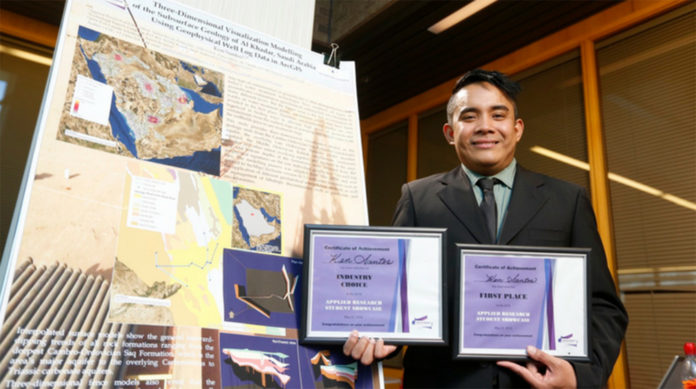
For Ken Santos, just hearing his name called once at the Saskatchewan Polytechnic Applied Research Student Showcase was an honour.
Hearing it twice was beyond expectation.
Santos, GIS student researcher at the school’s Prince Albert campus, won the top research prize at the provincial student showcase and followed it up by taking home the Industry Choice Award.
It was an exciting moment for Santos, who worked as a geologist in the Middle East prior to beginning his studies in Saskatchewan. It’s also one that left him speechless.
“Until this moment, I was really lost for words,” Santos chuckled during an interview on Thursday. “It was such a great honour to be awarded those awards.”
Santos’ research project focuses on subsurface geology in Saudi Arabia, but it could have implications for the oil, gas and mining industries here in Saskatchewan.
The official title of his project was, “Three-dimensional visualization of the subsurface geology of Al Khadar, Saudi Arabia using geophysical well log data in ArcGIS.” In regular terms, it’s about minimizing the contamination of groundwater before it arrives at a water treatment plant.
“It doesn’t just provide solutions to the environmental problem that we were tackling in the Middle East, it also established a workflow and how to do it, and the workflow itself is applicable to different industries,” he explained.
Santos said treatment plants are equipped to remove almost all contamination prior to usage, but in some areas, the water is so contaminated it quickly uses up the “cleaning membranes.” Ideally, this project will help make an expensive task cheaper, while providing a more proactive solution.
“It’s not an easy thing to tackle,” Santos said. “What this research is trying to attain is to be able to avoid, or even just minimize, the contamination of groundwater in the raw output stage.”
This isn’t the first time Santos has been recognized for his work. Earlier this year he also received the Esri Canada Scholarship Award for the same project.
Despite the accolades, Santos remains humble about the success, thanking the two Saskatchewan Polytechnic instructors who helped supervise the project.
Having recently graduated, he’s hoping to continue his research with data from two more hotspots in Saudi Arabia.

